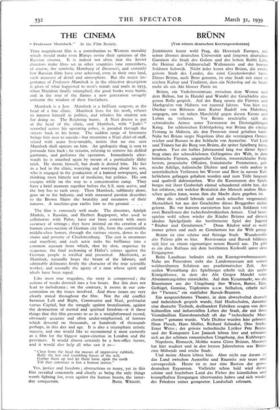THE CINEMA
4, Professor Mamlock." At the Film Society.
Tins magnificent film is a contribution to Western morality which should make even Blimps revise their opinions of the Russian cinema. It is indeed not often that the Soviet of course, the symbolic Hamburg of Deserter), and certainly when Nazidom finally triumphed, the good books were burnt, directors make films set in other countries (one remembers, few Russian films have ever achieved, even in their own land, such accuracy of detail and atmosphere. But the major im- portance of Professor Mamlock is in the objective description it gives of what happened to men's minds and souls in 1933, and in the roar of the flames a new generation savagely unlearnt the wisdom of their forefathers.
Mamlock is a Jew. Mamlock is a brilliant surgeon, at the head of a fine clinic. Mamlock lives for his work, refuses to interest himself in politics, and rebukes his student son for doing so. The Reichstag burns. A Nazi doctor is put at the head of the clinic, and Mamlock, with " Jude! " scrawled across his operating robes, is paraded through the streets back to his home. The sudden surge of bitterness brings him near to suicide—but meantime a Nazi chief-of-staff, seized with acute liver-trouble, insists that no one save Mamlock shall operate on him. An apologetic thug is sent to persuade him back ; he returns, refusing to remove his defiled garments, and performs the operation. Immediately after- wards he is smashed again by means of a particularly filthy trick. He shoots himself, but death is denied him. He lies in a bed in the clinic, worrying and worrying about his son, who is engaged in the production of a banned newspaper, and thinking most bitterly not of medicine, but politics. His son escapes while on the way to a concentration camp. They have a brief moment together before the S.S. men arrive, and the boy has to rush away. Then Mamlock, sublimely alone, goes on to the balcony, and with measured passion describes to the Brown Shirts the brutality and meanness of their natures. A machine-gun rattles him to the ground. . . .
The film is extremely well made. The directors, Adolph Minkin, a Russian, and Herbert Rappoport, who used to collaborate with Pabst, have not been content with mere accuracy of settings ; they have insisted on the creation of a human cross-section of German city life, from the comfortable middle-class homes, through the various streets, down to the slums and poverty of Charlottenburg. The cast is enormous and excellent, and each actor sinks his brilliance into a common account from which, shot by shot, sequence by sequence, the final reckoning of Hitler's crimes against the German people is totalled and presented. Mezhinski, as Mamlock, naturally bears the brunt of the labours, and admirably delineates firstly the character of the true scientific worker, and secondly the agony of a man whose spirit and ideals have been raped.
Like most true tragedies, the story is compressed ; the actions of weeks dovetail into a few hours. But this does not lead to melodrama ; on the contrary, it assists in our con- centration on the issues involved. And these issues are very clearly stated throughout the film. Not the old conflict between Left and Right, Communist and Nazi, proletariat versus Capital, but the struggle against brutalisation, against the destruction of mental and spiritual freedom—it iS these things that this film presents to us in a straightforward record, obviously accurate and often under-emphasised, of horrors which descend on thousands, or hundreds of thousands perhaps, in this day and age. It is also a triumphant artistic success, and one would like to recommend it most earnestly as a film for the biggest super-cinemas in London and the provinces. It would almost certainly be a box-office furore, and it would also help all who saw it to-
" Clear from the head the masses of impressive rubbish, Rally the lost and trembling forces of the will, Gather them up and let them loose upon the earth Till they construct at last a human justice."
Yes, justice and freedom ; abstractions to many, yet in this film revealed concretely and clearly as being the only things worth fighting for, even against the human beasts, the latter-


































































 Previous page
Previous page